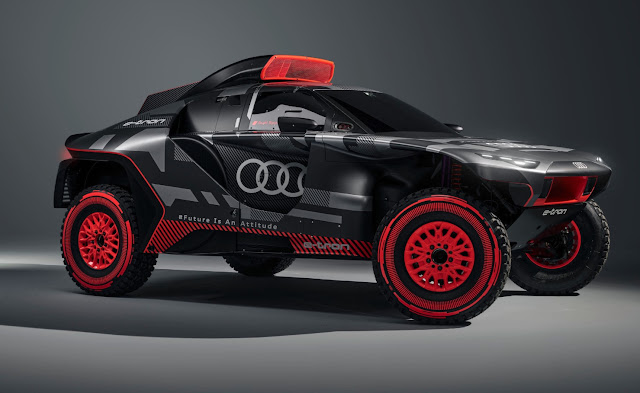Audi has started testing the new RS Q e-tron electric car
Clear the stage for an electrifying high-tech test laboratory: just under a year after the initial concept idea, Audi Sport has begun testing the new Audi RS Q e-tron, with which Audi will take on one of the most important challenges there is in the world of racing in January 2022: the Dakar Rally.
Unique: Audi wants to be the first car manufacturer to use an electrified drivetrain in combination with an efficient energy converter to compete for overall victory against conventionally-powered competitors in the world's toughest rally. "The quattro was a gamechanger for the World Rally Championship. Audi was the first brand to win the Le Mans 24 Hours with an electrified drivetrain. Now, we want to usher in a new era at the Dakar Rally while testing and further developing our e-tron technology under extreme circumstances," says Julius Seebach, Managing Director of Audi Sport GmbH and responsible for motorsport at Audi. “Our RS Q e-tron was created on a blank sheet of paper in record time and stands for Vorsprung durch Technik.”
The characteristics of the Dakar Rally present the engineers with unique challenges. The marathon event lasts two weeks, and the daily stages are up to 800 kilometres in length. "That's a very long distance," says Andreas Roos, responsible for the Dakar project at Audi Sport. "What we are trying to do has never been done before. This is the ultimate challenge for an electric drivetrain."
Because there are no charging possibilities in the desert, Audi has chosen an innovative charging concept: Onboard the Audi RS Q e-tron, the highly efficient TFSI engine from the DTM. It is part of an energy converter that charges the high-voltage battery while driving. Since the combustion engine is operated in the particularly efficient range of between 4,500 and 6,000 rpm, the specific consumption is well below 200 grams per kWh.
The drivetrain of the Audi RS Q e-tron is electric. The front and rear axles are fitted with a motor-generator unit (MGU) from the current Audi e-tron FE07 Formula E car, which Audi Sport has developed for the 2021 season. Therefore, only minor modifications had to be made to use the MGU in the Dakar Rally.
A third MGU of identical design is part of the energy converter and recharges the high-voltage battery while driving. In addition, energy is recuperated during braking. The battery weighs about 370 kilograms and has a capacity of around 50 kWh.
On the way to its debut at the Dakar Rally in January 2022, the team of Audi Sport has taken another important step: The new Audi RS Q e-tron completed an eight-day endurance test in sweltering heat in Spain on gravel sections of the kind typically used in cross-country rallies.
The roll-out in Neuburg an der Donau on June 30th was an initial functional check for the innovative rally car. Next, a test in Magdeburg's area in mid-July focused on gathering initial experiences on unpaved ground. Now the first test in practical conditions followed at a test area near the Spanish city of Zaragoza.
All three of Audi Sport's driver teams took part in the test in Aragon. Dakar record winner Stéphane Peterhansel and his co-driver Edouard Boulanger drove the first stint from Friday to Sunday. Mattias Ekström and Emil Bergkvist took over the Audi RS Q e-tron on Monday for the next two test days. Carlos Sainz and Lucas Cruz concluded the exhaustive trials from Wednesday to Friday.
The three-driver teams were impressed with the handling and reliability of the futuristic SUV on the fast gravel segments. "For the first test in proper conditions for the car, I'm thrilled how the car behaves already," said Carlos Sainz on behalf of his fellow drivers. "I had an excellent feeling straight away. Then, of course, there is fine-tuning to be done – but the starting point is good."
On the up to 17-kilometre long gravel sections, the Audi RS Q e-tron achieved a top speed of 180 km/h. In addition, temperatures of up to 34 degrees centigrade in the shade marked an initial litmus test for the cooling concept of the complex vehicle.
The maximum system power of the e-drivetrain is 500 kW. How much of this may be used during the Dakar Rally is still being finalized by the organizers. The electric drivetrain offers many advantages. The electric motors can be controlled highly precisely and can thus ensure good drivability. In addition, braking energy can be recovered.
The Audi RS Q e-tron electric car only needs one forward gear. This is because the front and rear axles are not mechanically connected, as is also common in electric vehicles. Instead, the software developed by Audi takes over the torque distribution between the axles. It thus creates a virtual and freely configurable centre differential, which has the positive side effect of saving the weight and space that prop shafts and a mechanical differential would have required.
Visually, the Audi RS Q e-tron also differs significantly from conventionally-powered Dakar prototypes. "The vehicle looks futuristic and has many design elements that are typical of Audi," says Juan Manuel Diaz, Team Leader of Motorsport Design at Audi. "We aimed to symbolize Vorsprung durch Technik and the future of our brand."
"This project's schedule is extremely packed and challenging," says Andreas Roos. "Less than twelve months have passed since the project officially started. We had to begin the development while the regulations for alternatively-powered vehicles had not even been finalized yet. And all of the development took place during the Corona pandemic. It would be best if you didn't underestimate that either. What the team has achieved so far is unique. The roll-out was an extraordinary moment for everyone."





